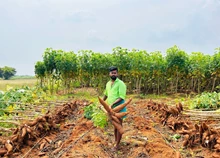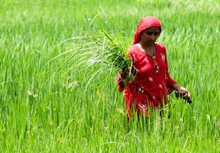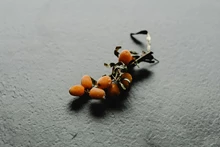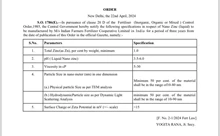
In addition, the USDA is announcing a USD 19 million investment in two nutrient management initiatives financed under the Regional Conservation Partnership Program (RCPP), as well as two new formal collaborations to further nutrient management implementation.
These investments prioritize the development and implementation of climate-smart techniques, such as nutrient management, which assists producers in managing nutrients and soil amendments to maximize economic advantage while minimizing environmental damage.
Vilsack made the announcement at Iowa State University in Ames, Iowa, where he emphasized the development and implementation of new and innovative technology and systems that will increase conservation efforts and agricultural production across the country. The news reflects President Biden's Investing in America agenda goals of rebuilding the economy from the bottom up and middle out, as well as unleashing a Made in America innovation boom. "Addressing climate change is a huge challenge, but agriculture plays a critical role, and we're grateful to our many partners who are assisting us in confronting the challenge head on."
"These new projects and agreements are aimed at mitigating climate change, conserving and protecting our water, improving soil health, and creating economic opportunities for producers," stated Vilsack. "We are empowering our partners to create new tools, technologies, and strategies to support next-generation conservation efforts on working lands and develop cost-effective resource solutions."
CIG Two of the 14 partners with funded CIG On-Farm Trials programmes are from Iowa. This year, the USDA's Natural Resources Conservation Service (NRCS) will invest USD 25 million in On-Farm Trials, a programme that encourages the widespread adoption and evaluation of innovative conservation measures in collaboration with agricultural producers. Producers receive incentive payments to cover the risk of employing novel approaches.
The benefits of a relay intercropping system for maintaining or boosting production and profitability while improving soil health and increasing nutrient reductions will be demonstrated by Iowa State University of Science and Technology. A diverse intercropping system increases cropping system resilience and promotes a more diverse and stable community of soil organisms, ranging from bacteria to earthworms, while reducing diseases and crop pests and benefiting nutrient cycling and soil structure. The Iowa Soybean Association advocates for the use of freshly synthesized cropping systems that boost profitability, reduce nutrient losses, and promote soil health.
Crop modelling and statistical analysis will be used to characterize profitability and natural resource outcomes for enhanced cropping systems, as well as produce new economic insights, natural resource conservation, and improved cropping system stability. Meanwhile, the NRCS is investing USD 15 million in 17 projects under CIG Classic, which allows partners to create new tools, technologies, and strategies to assist next-generation conservation initiatives on working lands as well as market-based solutions to resource concerns. The NRCS website has a list of all CIG Classic and CIG On-Farm Trials projects that have been granted. For fiscal year 2022, the NRCS has set aside specific funds for CIG Classic and On-Farm initiatives that solely benefit underprivileged producers, which includes producers who previously had access to or did not engage in NRCS programmes.
This comprises producers who are socially disadvantaged, war veterans, first-time farmers, and producers with limited resources. Applicants that competed for these set-aside monies were also able to forgo the non-federal match requirements. CIG On-Farm Trials will receive additional funding in fiscal year 2023. The IRA committed USD 19.5 billion to support climate-smart practices through NRCS conservation programs, allowing the NRCS to invest USD 50 million each year for CIG On-Farm Trials from fiscal years 2023 to 2027. The NRCS will prioritize applications that focus on diet and feed management to reduce enteric methane emissions from livestock in the upcoming request for proposals. More details about the fiscal year 2023 request for proposals will be released soon.
Through the RCPP, the NRCS issued two funds to help producers achieve more efficient nutrient management within selected critical conservation areas (CCA): Family Farms LLC will increase soil health and reduce nitrogen application to and loss from agriculture in the Mississippi River Basin. This will be accomplished through nutrient management programmes that include the use of biochar to assist conserve nutrients by increasing nutrient efficiency. To reduce excess fertilizer run-off negatively damaging the watershed, The Environmental Initiative, Inc. will deploy "nutrientsheds," which are interconnected networks of geographically close farms that move and balance nutrient needs. Participating producers will get nutrient management plans for each of the two proposed "nutrientsheds" so that manure from participating farms can be collected and processed through the partners' centralized thermophilic anaerobic digesters.
The main partner must work directly with agricultural producers through RCPP Grants to assist the development of novel conservation structures and techniques that would not otherwise be available through RCPP Classic. The more than USD 19 million given through these awards adds to the USD 200 million previously awarded in RCPP Alternative Funding Arrangement and RCPP Classic partnership projects in fiscal year 2022. The RCPP funding opportunity for fiscal year 2023 will be disclosed in late Spring. The Inflation Reduction Act included an additional USD 4.95 billion in RCPP over four years beginning in fiscal year 2023 to help producers prepare for and reduce the effects of climate change.
Furthermore, as part of its endeavour to improve the use of nutrient management strategies, the NRCS has signed two Memorandums of Understanding (MOUs) that advance its conservation efforts aimed at enhancing nutrient management: The American Society of Agronomy (ASA) and its International Certified Crop Adviser (ICCA) Program develop a framework that allows the ASA to recommend individuals for the NRCS Technical Service Provider (TSP) programme. The TSP programme allows certified individuals outside of the NRCS to give growers and landowners with nutrient management plans, among other things.
Truterra (a Land O' Lakes company) intends to investigate opportunities to increase nutrient management adoption and technical capabilities of producers and landowners; evaluate Truterra's capabilities and tools for delivering nutrient management technical assistance; expedite and streamline the technical assistance delivery system; and collaborate on assessment tools and opportunities to increase producer participation in broader NRCS programmes. The NRCS will continue to utilize new collaborations to increase capacity and reach out to new producers with technical and financial assistance.











